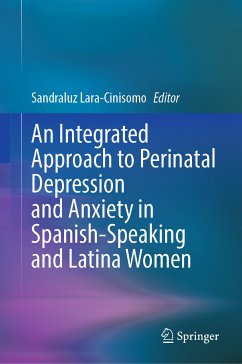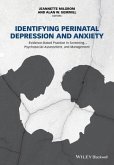This groundbreaking book compiles essential and timely insights into the factors associated with perinatal depression and anxiety among Spanish-speaking and Latina women. It delves into crucial themes, such as migration-related experiences. Additionally, it explores policies in Latin America aimed at addressing maternal mental health needs. Furthermore, the book provides fundamental knowledge on tailoring culturally and linguistically appropriate interventions for perinatal depression and anxiety among Spanish-speaking and Latina women. Recognizing the significance of context, it offers perspectives on the effects of natural disasters and health crises on perinatal mental health and mother-infant bonding. The book advocates for the development of a research and mental health workforce attuned to the diverse needs of Spanish-speaking and Latina/Latinx perinatal women. It also discusses the value of biomarkers in perinatal depression research. In sum, this book brings together topic experts from across the globe to provide a more holistic approach to perinatal depression and anxiety. Key topics covered include:
- Anxiety and Worry During the Perinatal Period: Why They Cannot Be Ignored
- Protective Factors Against Depression and Anxiety Among Latinas and Spanish-Speaking Women
- Culturally Sensitive Interventions for Latinas and Spanish-Speaking Women
- Advancing Research in Perinatal Mental Health in Spanish-Speaking Latin American Women
- Developing a Culturally Responsive Mental Health Workforce for Spanish-speaking and Latina/Latinx Birthing People with Perinatal Depression and Anxiety
An Integrated Approach to Perinatal Depression and Anxiety in Spanish-Speaking and Latina Women is pertinent reading for individuals interested in pursuing a degree and profession in perinatal mental health, clinicians working with Spanish-speaking and Latina/Latinx perinatal women, researchers interested in working with Spanish-speaking and Latina/Latinx perinatal women, and educators training individuals pursuing a degree and profession in perinatal mental health.
Dieser Download kann aus rechtlichen Gründen nur mit Rechnungsadresse in A, B, BG, CY, CZ, D, DK, EW, E, FIN, F, GR, HR, H, IRL, I, LT, L, LR, M, NL, PL, P, R, S, SLO, SK ausgeliefert werden.









